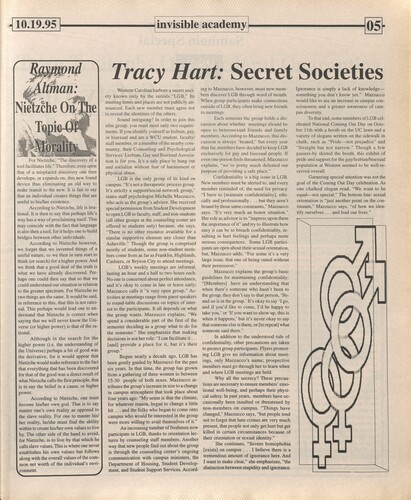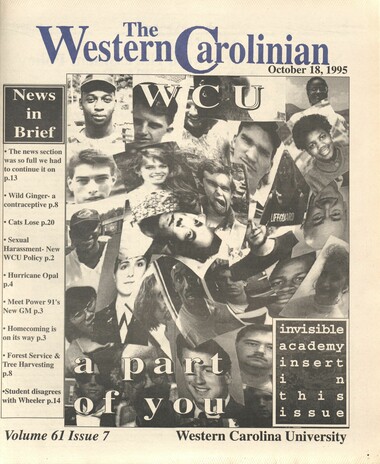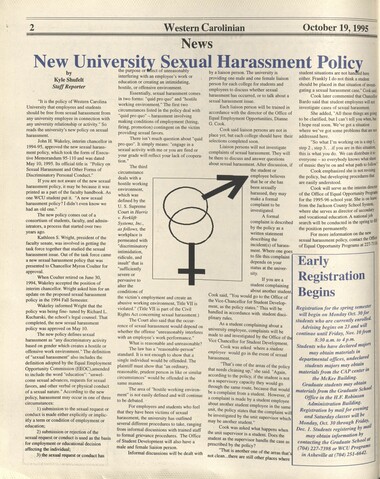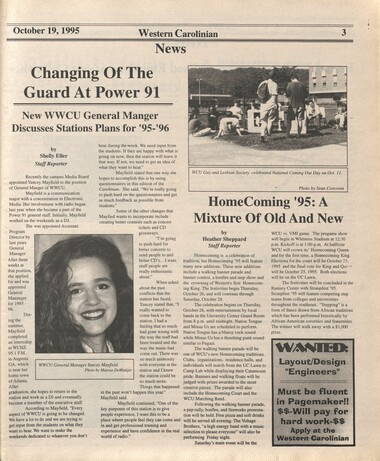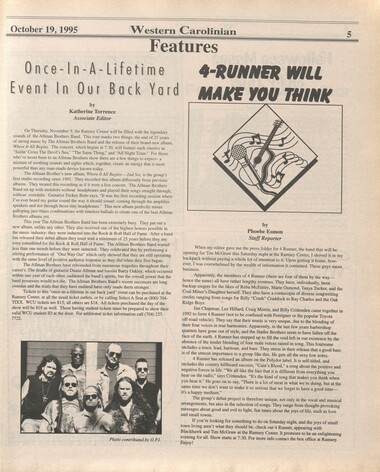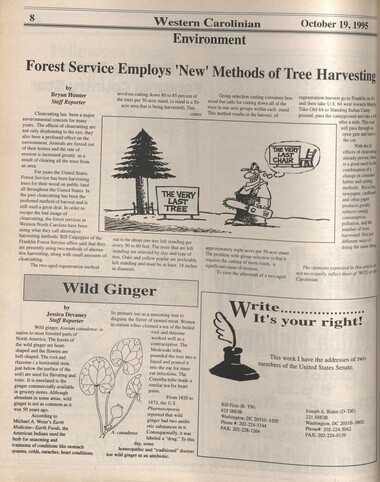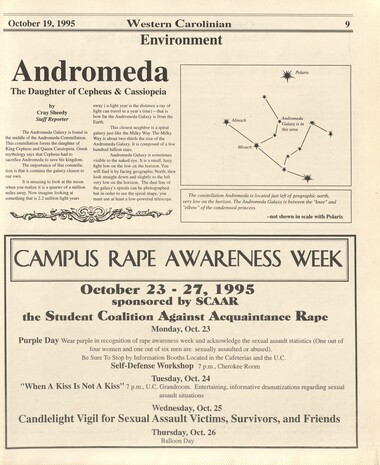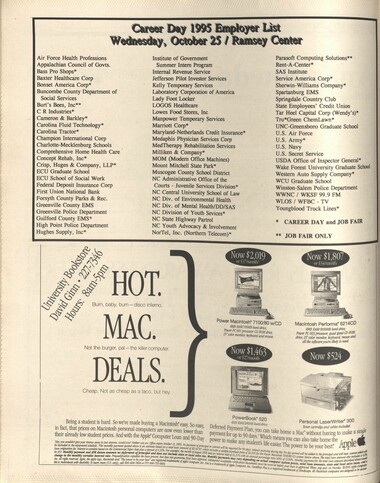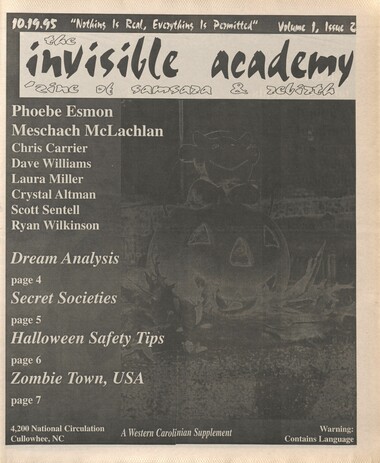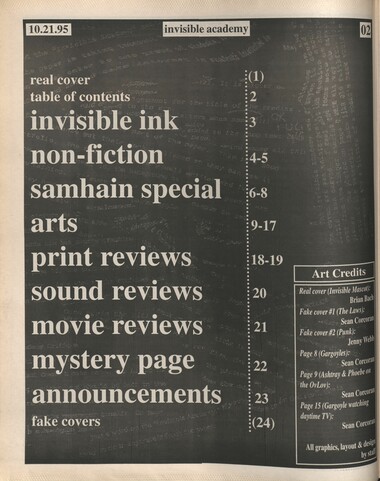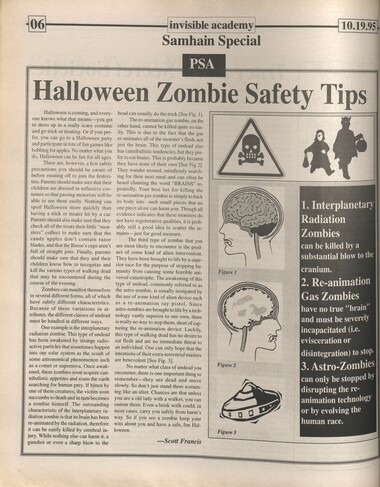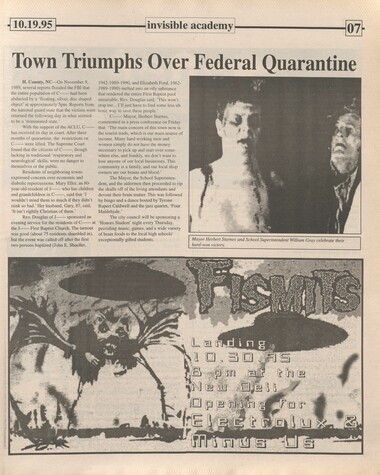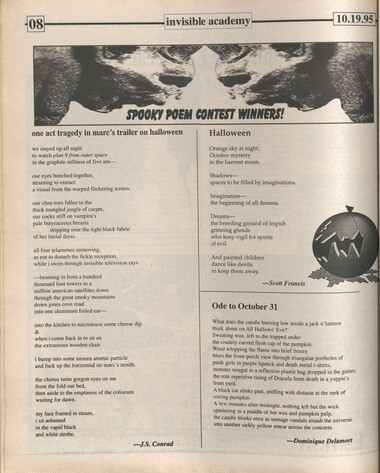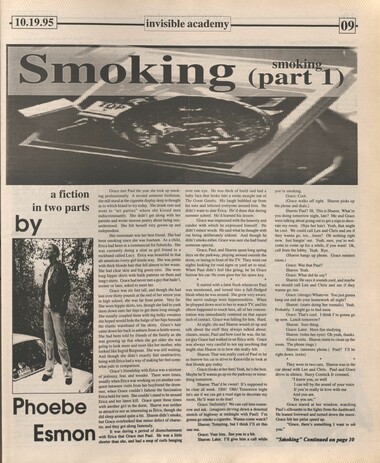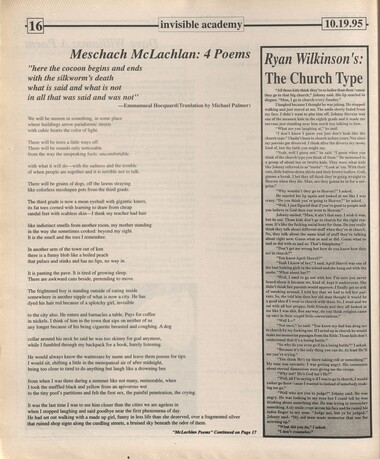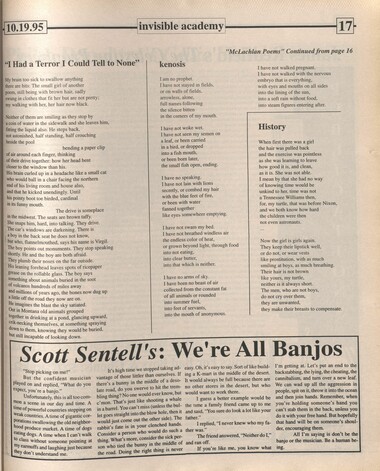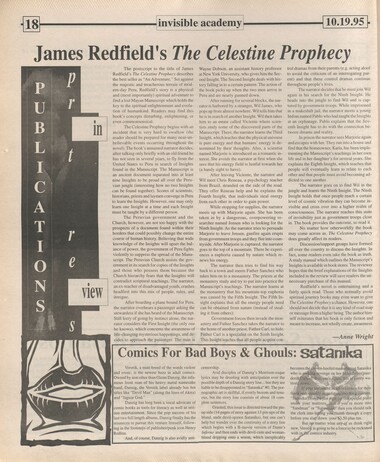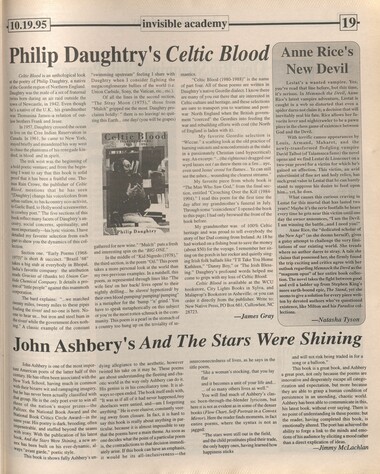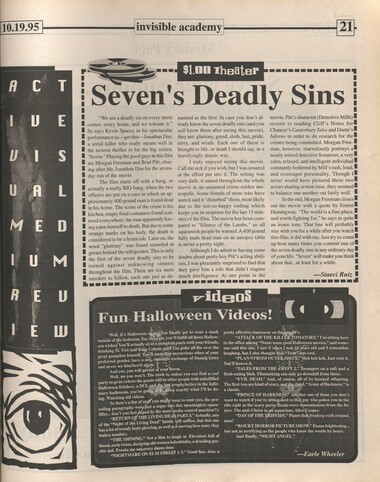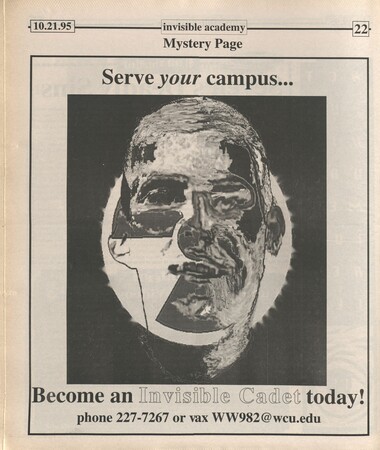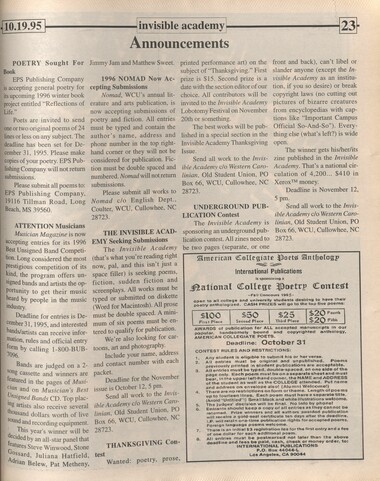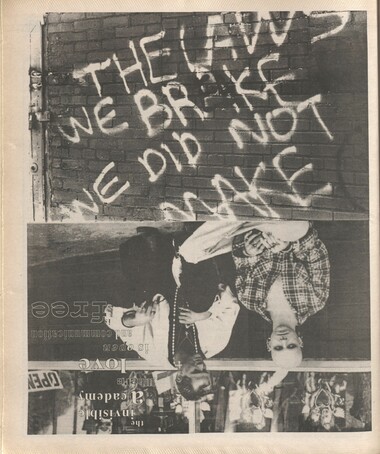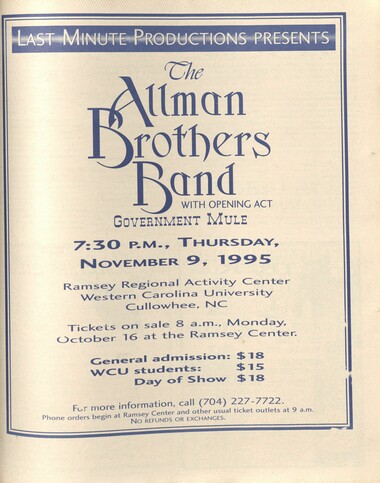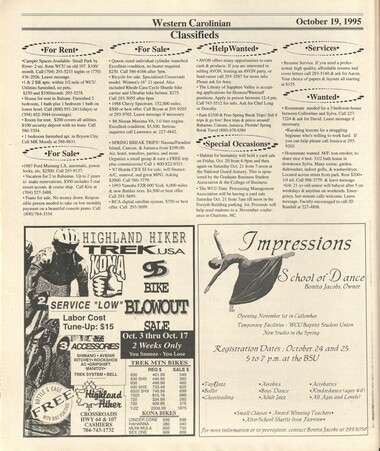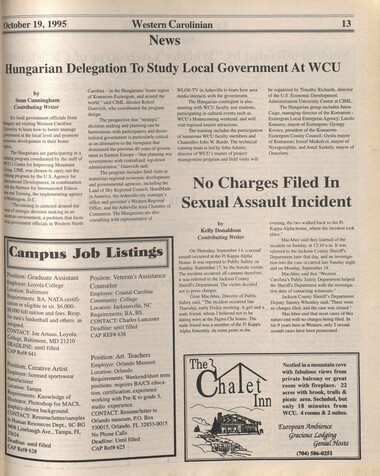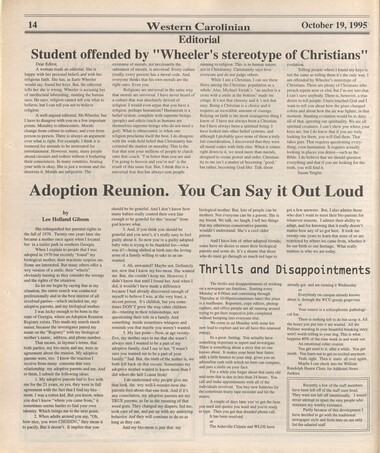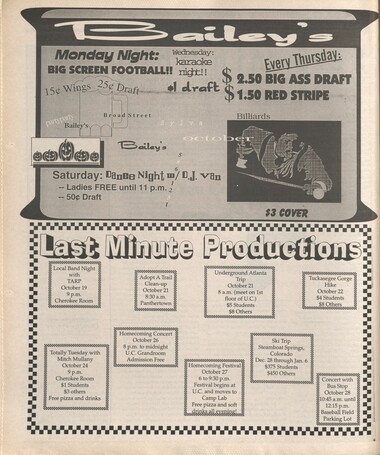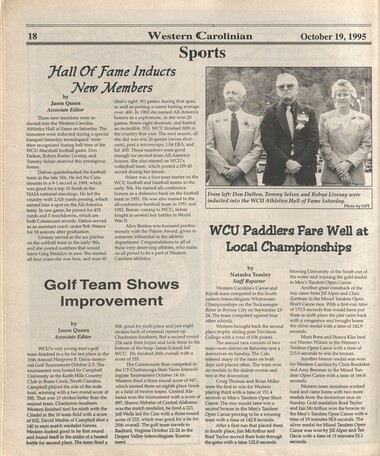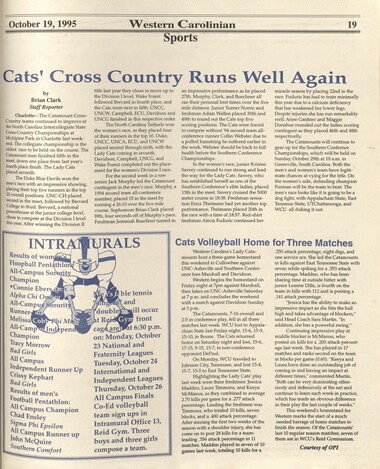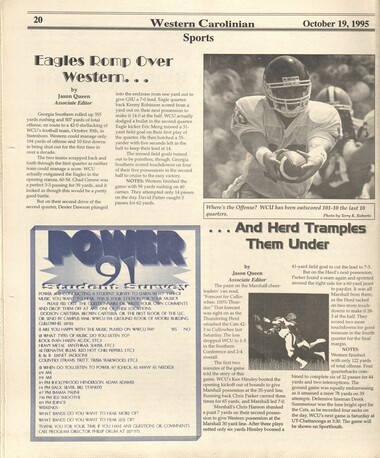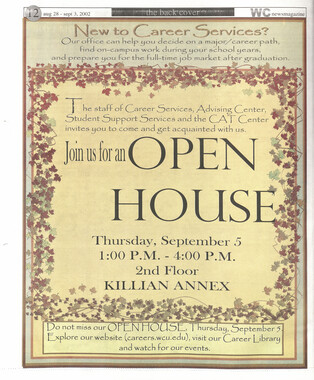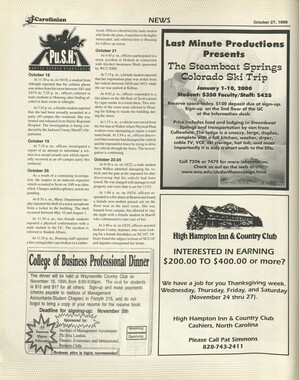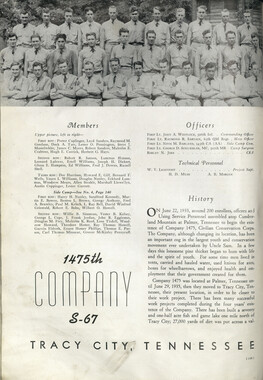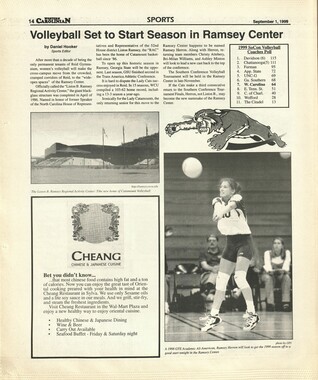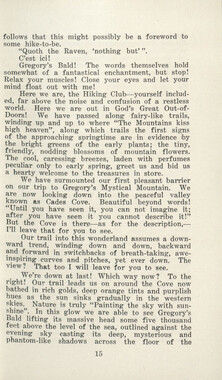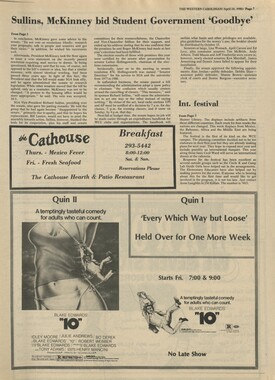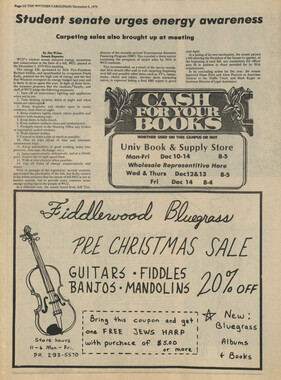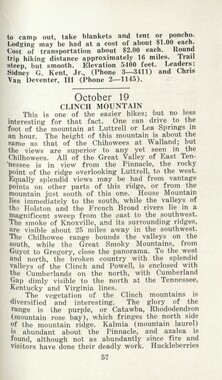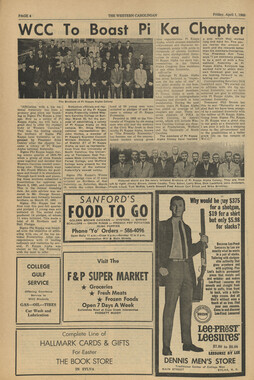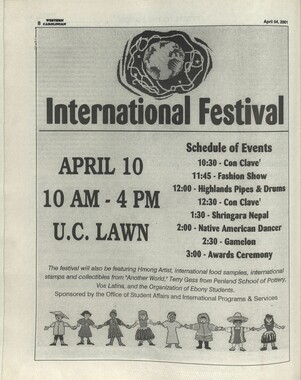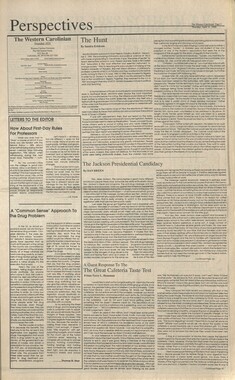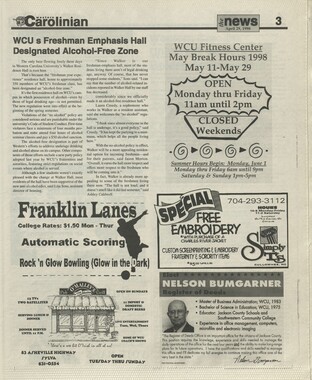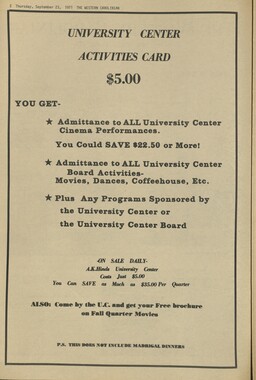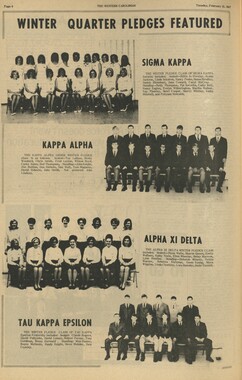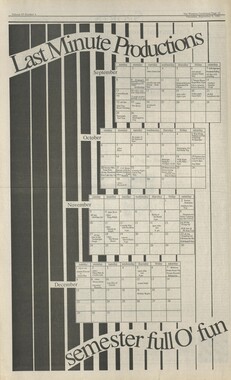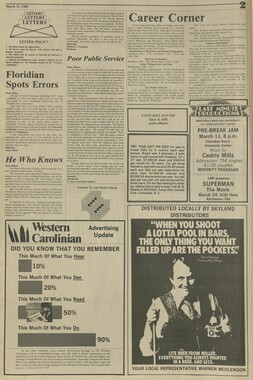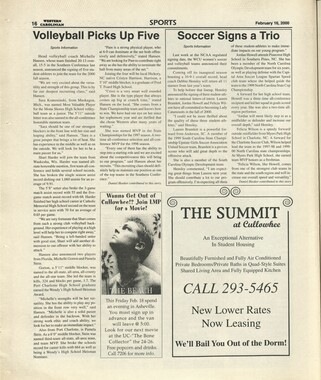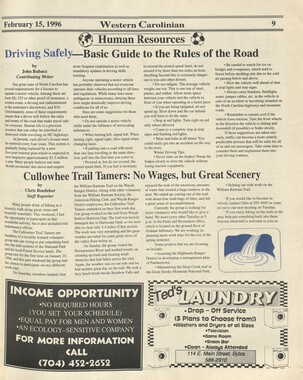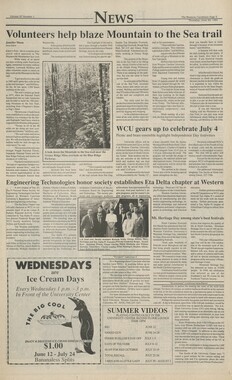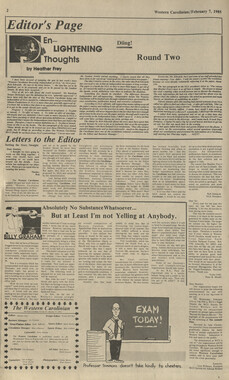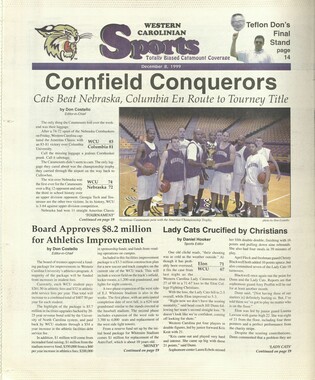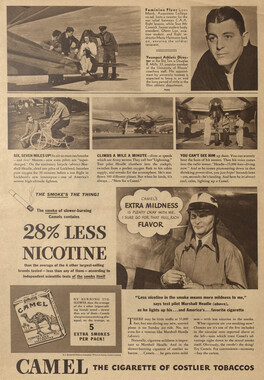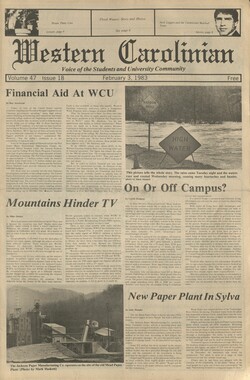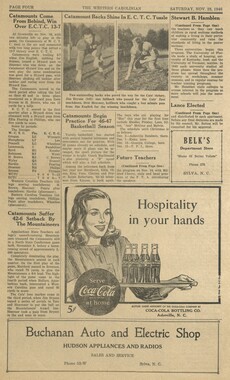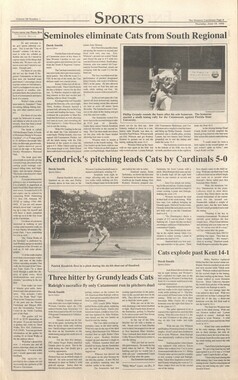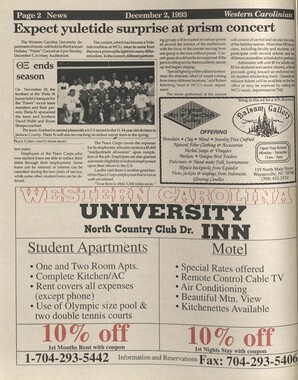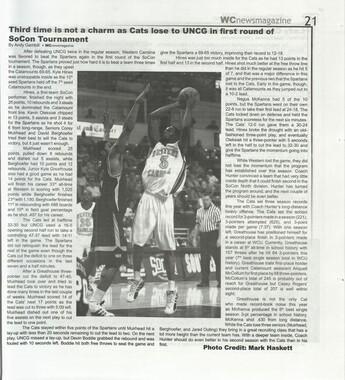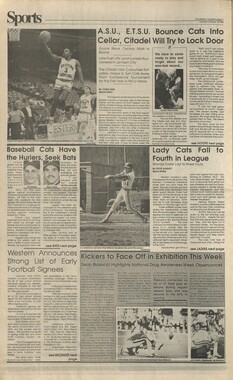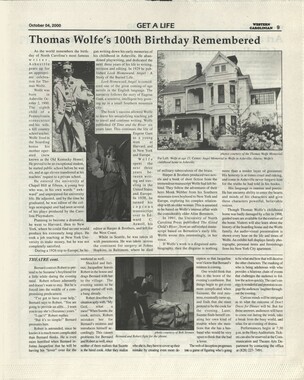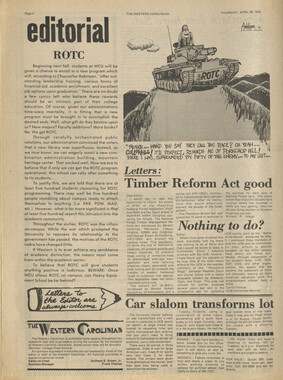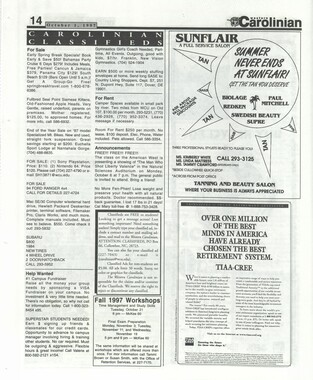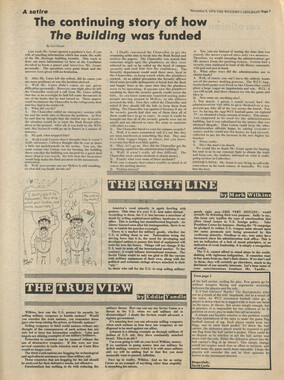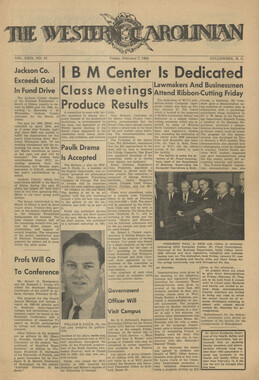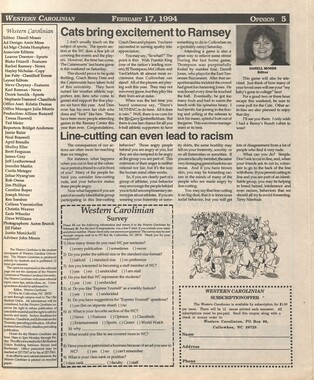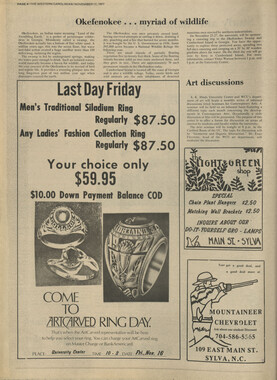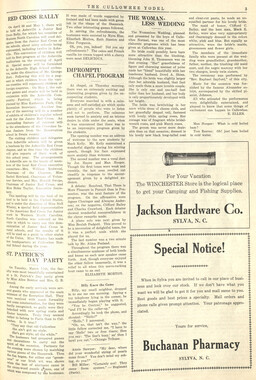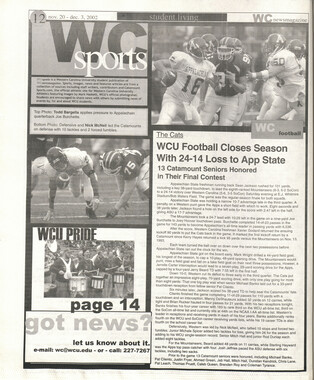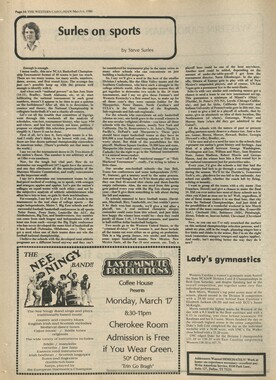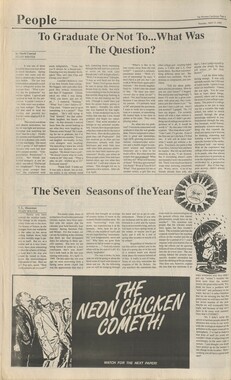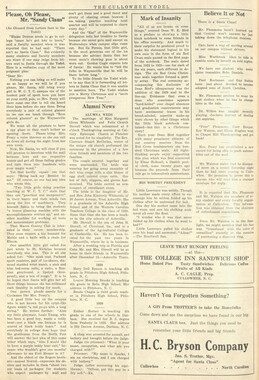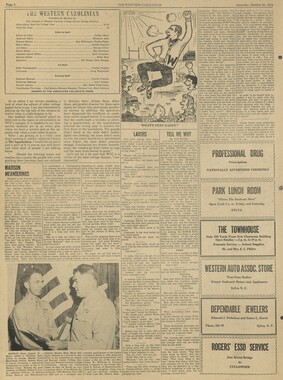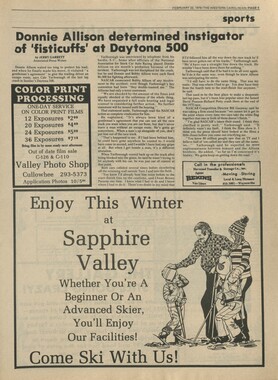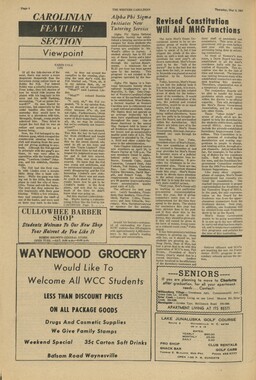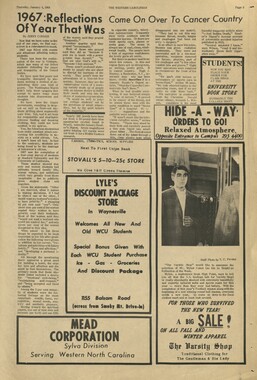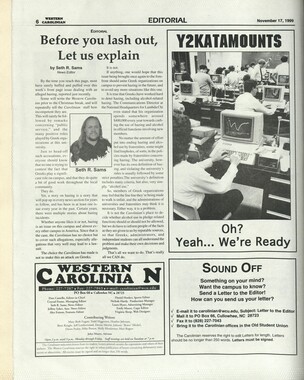Western Carolina University (21)
View all
- Canton Champion Fibre Company (2308)
- Cherokee Traditions (291)
- Civil War in Southern Appalachia (165)
- Craft Revival (1942)
- George Masa Collection (137)
- Great Smoky Mountains - A Park for America (3080)
- Highlights from Western Carolina University (422)
- Horace Kephart (973)
- Journeys Through Jackson (159)
- LGBTQIA+ Archive of Jackson County (89)
- Oral Histories of Western North Carolina (318)
- Picturing Appalachia (6617)
- Stories of Mountain Folk (413)
- Travel Western North Carolina (153)
- Western Carolina University Fine Art Museum Vitreograph Collection (129)
- Western Carolina University Herbarium (92)
- Western Carolina University: Making Memories (738)
- Western Carolina University Publications (2491)
- Western Carolina University Restricted Electronic Theses and Dissertations (146)
- Western North Carolina Regional Maps (71)
- World War II in Southern Appalachia (131)
University of North Carolina Asheville (6)
View all
- Allanstand Cottage Industries (62)
- Appalachian National Park Association (53)
- Bennett, Kelly, 1890-1974 (1463)
- Berry, Walter (76)
- Brasstown Carvers (40)
- Carver, George Washington, 1864?-1943 (26)
- Cathey, Joseph, 1803-1874 (1)
- Champion Fibre Company (233)
- Champion Paper and Fibre Company (297)
- Cherokee Indian Fair Association (16)
- Cherokee Language Program (22)
- Crowe, Amanda (40)
- Edmonston, Thomas Benton, 1842-1907 (7)
- Ensley, A. L. (Abraham Lincoln), 1865-1948 (275)
- Fromer, Irving Rhodes, 1913-1994 (70)
- George Butz (BFS 1907) (46)
- Goodrich, Frances Louisa (120)
- Grant, George Alexander, 1891-1964 (96)
- Heard, Marian Gladys (60)
- Kephart, Calvin, 1883-1969 (15)
- Kephart, Horace, 1862-1931 (313)
- Kephart, Laura, 1862-1954 (67)
- Laney, Gideon Thomas, 1889-1976 (439)
- Masa, George, 1881-1933 (61)
- McElhinney, William Julian, 1896-1953 (44)
- Niggli, Josephina, 1910-1983 (10)
- North Carolina Park Commission (105)
- Osborne, Kezia Stradley (9)
- Owens, Samuel Robert, 1918-1995 (11)
- Penland Weavers and Potters (36)
- Roberts, Vivienne (15)
- Roth, Albert, 1890-1974 (142)
- Schenck, Carl Alwin, 1868-1955 (1)
- Sherrill's Photography Studio (2565)
- Southern Highland Handicraft Guild (127)
- Southern Highlanders, Inc. (71)
- Stalcup, Jesse Bryson (46)
- Stearns, I. K. (213)
- Thompson, James Edward, 1880-1976 (226)
- United States. Indian Arts and Crafts Board (130)
- USFS (683)
- Vance, Zebulon Baird, 1830-1894 (1)
- Weaver, Zebulon, 1872-1948 (58)
- Western Carolina College (230)
- Western Carolina Teachers College (282)
- Western Carolina University (2008)
- Western Carolina University. Mountain Heritage Center (18)
- Whitman, Walt, 1819-1892 (10)
- Wilburn, Hiram Coleman, 1880-1967 (73)
- Williams, Isadora (3)
- Cain, Doreyl Ammons (0)
- Crittenden, Lorraine (0)
- Rhodes, Judy (0)
- Smith, Edward Clark (0)
- Appalachian Region, Southern (3032)
- Asheville (N.C.) (1945)
- Avery County (N.C.) (26)
- Blount County (Tenn.) (195)
- Buncombe County (N.C.) (1680)
- Cherokee County (N.C.) (283)
- Clay County (N.C.) (556)
- Graham County (N.C.) (238)
- Great Smoky Mountains National Park (N.C. and Tenn.) (525)
- Haywood County (N.C.) (3573)
- Henderson County (N.C.) (70)
- Jackson County (N.C.) (4925)
- Knox County (Tenn.) (35)
- Knoxville (Tenn.) (13)
- Lake Santeetlah (N.C.) (10)
- Macon County (N.C.) (421)
- Madison County (N.C.) (216)
- McDowell County (N.C.) (39)
- Mitchell County (N.C.) (135)
- Polk County (N.C.) (35)
- Qualla Boundary (982)
- Rutherford County (N.C.) (78)
- Swain County (N.C.) (2185)
- Transylvania County (N.C.) (270)
- Watauga County (N.C.) (12)
- Waynesville (N.C.) (86)
- Yancey County (N.C.) (72)
- Aerial Photographs (3)
- Aerial Views (60)
- Albums (books) (4)
- Articles (1)
- Artifacts (object Genre) (228)
- Bibliographies (1)
- Biography (general Genre) (2)
- Cards (information Artifacts) (38)
- Clippings (information Artifacts) (192)
- Copybooks (instructional Materials) (3)
- Crafts (art Genres) (622)
- Depictions (visual Works) (21)
- Design Drawings (1)
- Digital Moving Image Formats (2)
- Drawings (visual Works) (185)
- Envelopes (101)
- Exhibitions (events) (1)
- Facsimiles (reproductions) (1)
- Fiction (general Genre) (4)
- Financial Records (12)
- Fliers (printed Matter) (67)
- Glass Plate Negatives (381)
- Guidebooks (2)
- Internegatives (10)
- Interviews (823)
- Land Surveys (102)
- Letters (correspondence) (1045)
- Manuscripts (documents) (618)
- Maps (documents) (177)
- Memorandums (25)
- Minutes (administrative Records) (59)
- Negatives (photographs) (6090)
- Newsletters (1290)
- Newspapers (2)
- Notebooks (8)
- Occupation Currency (1)
- Paintings (visual Works) (1)
- Pen And Ink Drawings (1)
- Periodicals (194)
- Personal Narratives (10)
- Photographs (12977)
- Plans (maps) (1)
- Poetry (6)
- Portraits (4568)
- Postcards (329)
- Programs (documents) (181)
- Publications (documents) (2444)
- Questionnaires (65)
- Relief Prints (26)
- Sayings (literary Genre) (1)
- Scrapbooks (282)
- Sheet Music (2)
- Slides (photographs) (402)
- Songs (musical Compositions) (2)
- Sound Recordings (802)
- Specimens (92)
- Speeches (documents) (18)
- Tintypes (photographs) (8)
- Transcripts (329)
- Text Messages (0)
- A.L. Ensley Collection (275)
- Appalachian Industrial School Records (7)
- Appalachian National Park Association Records (336)
- Axley-Meroney Collection (2)
- Bayard Wootten Photograph Collection (20)
- Bethel Rural Community Organization Collection (7)
- Blumer Collection (5)
- C.W. Slagle Collection (20)
- Canton Area Historical Museum (2110)
- Carlos C. Campbell Collection (462)
- Cataloochee History Project (64)
- Cherokee Studies Collection (4)
- Daisy Dame Photograph Album (5)
- Daniel Boone VI Collection (1)
- Doris Ulmann Photograph Collection (112)
- Elizabeth H. Lasley Collection (1)
- Elizabeth Woolworth Szold Fleharty Collection (4)
- Frank Fry Collection (95)
- George Masa Collection (173)
- Gideon Laney Collection (452)
- Hazel Scarborough Collection (2)
- Hiram C. Wilburn Papers (28)
- Historic Photographs Collection (236)
- Horace Kephart Collection (861)
- Humbard Collection (33)
- Hunter and Weaver Families Collection (1)
- I. D. Blumenthal Collection (4)
- Isadora Williams Collection (4)
- Jesse Bryson Stalcup Collection (47)
- Jim Thompson Collection (224)
- John B. Battle Collection (7)
- John C. Campbell Folk School Records (80)
- John Parris Collection (6)
- Judaculla Rock project (2)
- Kelly Bennett Collection (1482)
- Love Family Papers (11)
- Major Wiley Parris Civil War Letters (3)
- Map Collection (12)
- McFee-Misemer Civil War Letters (34)
- Mountain Heritage Center Collection (4)
- Norburn - Robertson - Thomson Families Collection (44)
- Pauline Hood Collection (7)
- Pre-Guild Collection (2)
- Qualla Arts and Crafts Mutual Collection (12)
- R.A. Romanes Collection (681)
- Rosser H. Taylor Collection (1)
- Samuel Robert Owens Collection (94)
- Sara Madison Collection (144)
- Sherrill Studio Photo Collection (2558)
- Smoky Mountains Hiking Club Collection (616)
- Stories of Mountain Folk - Radio Programs (374)
- The Reporter, Western Carolina University (510)
- Venoy and Elizabeth Reed Collection (16)
- WCU Gender and Sexuality Oral History Project (36)
- WCU Mountain Heritage Center Oral Histories (25)
- WCU Oral History Collection - Mountain People, Mountain Lives (71)
- WCU Students Newspapers Collection (1923)
- Western North Carolina Tomorrow Black Oral History Project (69)
- William Williams Stringfield Collection (2)
- Zebulon Weaver Collection (109)
- African Americans (390)
- Appalachian Trail (35)
- Artisans (521)
- Cherokee art (84)
- Cherokee artists -- North Carolina (10)
- Cherokee language (21)
- Cherokee pottery (101)
- Cherokee women (208)
- Church buildings (190)
- Civilian Conservation Corps (U.S.) (111)
- College student newspapers and periodicals (2012)
- Dams (108)
- Dance (1023)
- Education (222)
- Floods (63)
- Folk music (1015)
- Forced removal, 1813-1903 (2)
- Forest conservation (220)
- Forests and forestry (1198)
- Gender nonconformity (4)
- Great Smoky Mountains National Park (N.C. and Tenn.) (181)
- Hunting (47)
- Landscape photography (25)
- Logging (122)
- Maps (83)
- Mines and mineral resources (9)
- North Carolina -- Maps (18)
- Paper industry (38)
- Postcards (255)
- Pottery (135)
- Railroad trains (72)
- Rural electrification -- North Carolina, Western (3)
- School integration -- Southern States (2)
- Segregation -- North Carolina, Western (5)
- Slavery (5)
- Sports (452)
- Storytelling (243)
- Waterfalls -- Great Smoky Mountains (N.C. and Tenn.) (66)
- Weaving -- Appalachian Region, Southern (280)
- Wood-carving -- Appalachian Region, Southern (328)
- World War, 1939-1945 (173)
Western Carolinian Volume 61 Number 07 (08)
Item
Item’s are ‘child’ level descriptions to ‘parent’ objects, (e.g. one page of a whole book).
-
-
10.19.95 invisible academy 05 Itman: TWT* T_l Cl _rv *r Nietzche On* Tracy Hart: Secret Societies For Nietzche, "The discovery of a tool facilitates life." Therefore, even upon that of a misplaced discovery one then develops, or expands on, this new found device thus eliminating an old way to make transit to the new. It is fair to say that an individual creates things that are useful to his/her existence. According to Nietzche, life is irrational. It is then to say that perhaps life's way has a way of proclaiming itself. This may coincide with the fact that language is also then a tool, for it helps one to build bridges between other individuals. According to Nietzche however, we forget that we invented things of a useful nature, so we then in turn start to think (or search) for a higher power. And we think that a good deal of the truth is what we have already discovered. Perhaps one could then say that so that we could understand our situation in relation to the greater spectrum. For Nietzche no two things are the same. It would be said, in reference to this, that this is not rational. This perhaps would lead one to understand that Nietzche is correct when saying that we will never know the Universe (or higher power) is that of the rational. Although in the search for the higher power (i.e. the understanding of the Universe) perhaps a bit of good was the derivative, for it would appear that Nietzche would make reference to the fact that everything that has been discovered for that of the good was a direct result of what Nietzche calls the first principle, that is to say the belief in a cause, or higher power. According to Nietzche, one must become his/her own god. That is to say master one's own reality as opposed to the slave reality. For one to master his/ her reality, he/she must find the ability within to create his/her own values to live by. The other side of the hand to avoid, for Nietzche, is to live by that which he calls slave values. This is where one never establishes his own values but follows along with the overall values of the common net worth of the individual's environment. Western Carolina harbors a secret society known only by the initials "LGB." Its meeting times and places are not publicly announced. Each new member must agree not to reveal the identities of the others. Sound intriguing? In order to join this elite group, you must meet only two requirements. If you identify yourself as lesbian, gay, or bisexual and are a WCU student, faculty/ staff member, or a member of the nearby community, then Counseling and Psychological Services' Lesbian, Gay and Bisexual Association is for you. It's a safe place to hang out and socialize without fear of harassment or physical abuse. LGB is the only group of its kind on campus. "It's not a therapeutic process group. It's strictly a support/social-network group," states staff psychologist Michelle Mazzucco, who acts as the group's advisor. She received special permission from Student Development to open LGB to faculty, staff, and non-students (all other groups at the counseling center are offered to students only) because, she says, "There is no other resource available for a similar supportive element any closer than Asheville." Though the group is comprised mostly of students, some non-student members come from as far as Franklin, Highlands, Cashiers, or Bryson City to attend meetings. LGB's weekly meetings are informal, lasting an hour and a half to two hours each. No one is concerned about perfect attendance, and it's okay to come in late or leave early; Mazzucco calls it "a very open group." Activities at meetings range from guest speakers to round-table discussions on topics of interest to the participants. It all depends on what the group wants. Mazzucco explains, "We spend a considerable part of the first of the semester deciding as a group what to do for the semester." She emphasizes that making decisions is not her role: "I can facilitate it... [and] provide a place for it, but it's their group." Begun nearly a decade ago, LGB has been gently guided by Mazzucco for the past six years. In that time, the group has grown from a gathering of three women to between 15-30 people of both sexes. Mazzucco attributes the group's increase in size to a change in campus atmosphere that took place about four years ago: "My sense is that the climate, for whatever reason, began to change a little bit... and the folks who began to come onto campus who would be interested in the group were more willing to avail themselves of it." An increasing number of freshmen now participate in LGB, thanks to orientation lectures by counseling staff members. Another way that new people find out about the group is through the counseling center's ongoing communication with campus ministers, the Department of Housing, Student Development, and Student Support Services. Accord ing to Mazzucco, however, most new members discover LGB through word of mouth. When group participants make connections outside of LGB, they often bring new friends to meetings. Each semester the group holds a discussion about whether meetings should be open to heterosexual friends and family members. According to Mazzucco, this discussion is always "heated," but every year thus far, members have decided to keep LGB exclusively for gay and bisexual people. If even one person feels threatened, Mazzucco explains, "we've pretty much defeated our purpose of providing a safe place." Confidentiality is a big issue in LGB. New members must be alerted to, and every member reminded of, the need for privacy. "I have to [maintain confidentiality], ethically and professionally . . . but they aren't bound by those same constraints," Mazzucco says. "It's very much an honor situation." Her role as advisor is to "impress upon them the importance of it" and try to illustrate how easy it can be to breach confidentiality, resulting in hurt feelings and perhaps more serious consequences. Some LGB participants are open about their sexual orientation, but, Mazzucco adds, "For some it's a very large issue, that one of being outed without their permission." Mazzucco explains the group's basic guidelines for maintaining confidentiality: "[Members] have an understanding that when there's someone who hasn't been to the group, they don't say to that person, 'So- and-so is in the group.' It's okay to say T go, and if you'd like to come, I'd be happy to take you,' or if you want to show up, this is when it happens,' but it's never okay to say that someone else is there, or [to repeat] what someone said there." In addition to the understood rule of confidentiality, other precautions are taken to protect group participants. Flyers promoting LGB give no information about meetings, only Mazzucco's name; prospective members must go through her to learn when and where LGB meetings are held. Why all the secrecy? These precautions are necessary to ensure members' emotional well-being, and perhaps their physical safety. In past years, members have occasionally been insulted or threatened by non-members on campus. "Things have changed," Mazzucco says, "but people tend not to forget that hate crimes are very much present, that people not only get hurt but get killed in certain circumstances because of their orientation or sexual identity." She continues, "Severe homophobia [exists] on campus ... I believe there is a tremendous amount of ignorance here. And I want to make clear," she emphasizes, "the distinction between stupidity and ignorance. Ignorance is simply a lack of knowledge— something you don't know yet." Mazzucco would like to see an increase in campus consciousness and a greater awareness of campus diversity. To that end, some members of LGB celebrated National Coming Out Day on October 11th with a booth on the UC lawn and a variety of slogans written on the sidewalk in chalk, such as "Pride—not prejudice" and "Straight but not narrow." Though a few passers-by skirted the booth, this exhibit of pride and support for the gay/lesbian/bisexual population at Western seemed to be well-received overall. Garnering special attention was not the goal of the Coming Out Day celebration. As one chalked slogan read, "We want to be equal—not special." The bottom line: sexual orientation is "just another point on the continuum," Mazzucco says, "of how we identify ourselves . . . and lead our lives."
Object
Object’s are ‘parent’ level descriptions to ‘children’ items, (e.g. a book with pages).
-
The Western Carolinian is Western Carolina University's student-run newspaper. The paper was published as the Cullowhee Yodel from 1924 to 1931 before changing its name to The Western Carolinian in 1933.
-

